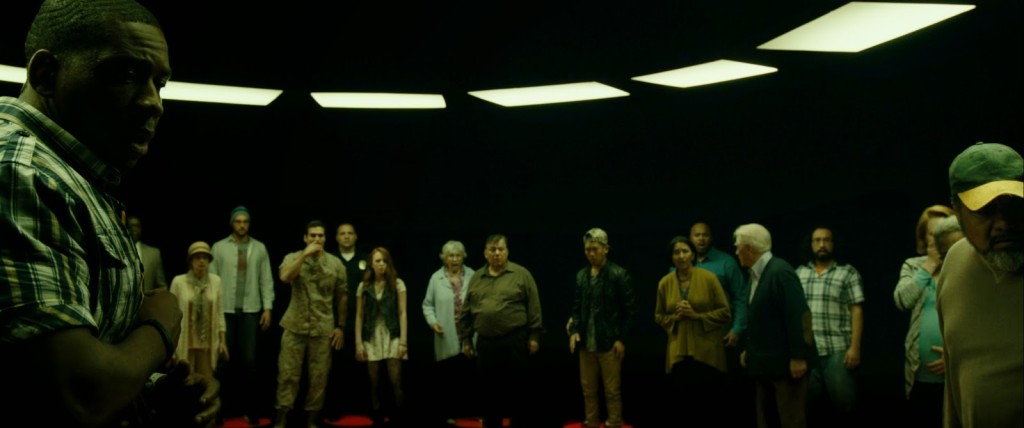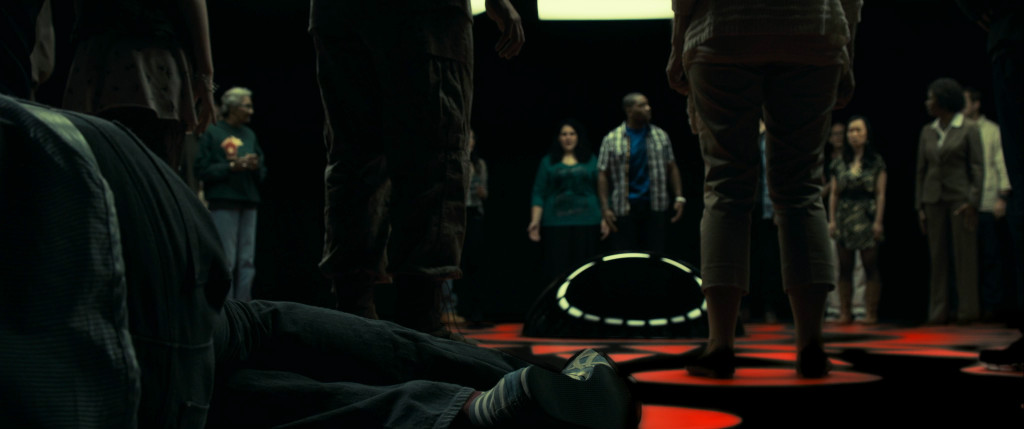It might seem cheap on the surface, but “Circle” has a lot to say about who we are - and where we’re going.
At first glance, Circle doesn’t seem to have much going for it. It’s cheap, it’s got cheesy, straightforward dialogue, and its concept points to pretty flat genre fare. Set almost entirely in one room, as a circle of people votes on who to kill off one-by-one until there’s only one left standing, it seems like the kind of glorified game show you’d see in the recesses of a bargain bin or deep in that part of Netflix.
But Circle is so much more than its simplistic surface. Ruthless, revelatory and massively relevant, it takes modern identity politics full circle, surprising us with some clever sci-fi twists along the way.
Circle hits a lot of my tastes and preferences pretty directly, so my appreciation for the film might be a little biased. Narratively, it fits quite neatly between two favorites of mine: the Doctor Who episode Bad Wolf - the one with futuristic takes on popular game shows - and the 2009 thriller Exam, another single-location psychological thriller with sci-fi elements and one-by-one elimination. Circle doesn’t, on first viewing, entirely live up to the impact of those favorites, but its proximity in subject matter is enough to pull me through even the most cringeworthy of lines (“c’mon, man!” / “No, you c’mon, man!”).
Circle’s unpoetic dialogue is certainly one of its biggest flaws, and the lack of time for character development and black-and-white simplicity of its themes might be a bit too melodramatic for some, but I, for one, think its obviousness is its greatest virtue.
The cast of characters is made up of 50 people, each of whom vote every few minutes on who should be killed next, with the assumption that only one will survive. How they got there is uncertain, but given the grim reality of their situation (they can’t move out of their spot, so it’s vote or die), a masochistic survival-of-the-smartest is inevitable.
The genius to this setup is not in the game itself, but in the communication between the people playing it. The group is clearly made to match up with general American demographics - there’s about the same amount of men and women, representative proportions of each major racial group, and a good diversity of age, sexuality, religion, vocation and personality type. Most of these characters are given less than a minute of screen time, with the structure of the film generally lending them most of their dialogue the round of the “game” they are eliminated.
There are, of course, a few people whose role is slightly more important to the dynamics of the game, such as a collaborative husband-and-wife duo (Matt Corboy and Julie Benz), a pregnant woman (Allegra Masters) and little girl (Molly Jackson), neither of whom anyone wants to vote off, and a rich man (Daniel Lench), who brashly tries to control proceedings, claiming his worth to be more because of his status. When all these personalities begin to mash together, Circle becomes a vital dissection of identity politics, with every character - given only seconds to introduce themselves before their life is literally put to a vote - reduced to blatant, thin stereotypes and judged solely on those characteristics.
The film is a potent study of mob rule, minority identity, and our perception of each other in this hype-driven age of Buzzfeed and Twitter. An intensely obvious microcosm of an all-too-intensely obvious world, Circle is just the silly sci-fi film 2015 needs. It covers practically every clickbait debate of our age - illegal immigration, police brutality, agism, sexism, racism, homophobia, classism, pro choice vs. pro life, religion vs. science - and works precisely because it’s so crudely wrought and clear-cut.
From a technical perspective, Circle is relatively low-key, though the production values are strong for the budget level. The cinematography and editing keep up with the ever-changing action energetically, and the film avoids looking too cheap by using CGI only when wholly necessary. Plot-wise, there are a few predictable twists, but in this what’s happening is far less important than how and why it’s happening.
Written and directed by Aaron Hann and Mario Miscione, Circle is at once the result of a winning collaboration and a study of the way we use collaboration to manipulate others for our own gain. It’s certainly not perfect by any stretch, but based purely on thematic necessity, this may be the most important film of 2015. (Un)fortunately, it doesn’t seem like that relevance is going anywhere anytime soon.
Circle is available to watch on Netflix.









